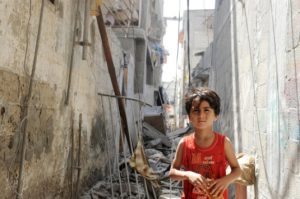Palestinian Australians welcome Gaza plan
Palestinians living in Australia have cautiously welcomed the US-brokered peace plan for Gaza, but they say it can only a first step in self-determination for Palestinian self-determination.
Former Palestinian humanitarian worker Eyad Almasri said the UN’s endorsement of the plan was a “good first step”.
“Anything that stops the war and the killing we welcome. We support the plan if it brings safety and security to Gaza and if aid is allowed in,” Eyad said.
“But the plan must give Palestinians rights, and it must stop the occupation.
“So far, from what I’ve read the plan will only stop the war. As a first step, that’s good.
“But we, as Palestinians, want rights and self-determination. We want to live like the people of other countries live with rights and freedom.
 “We want out children to live in safety and with the freedoms children in other countries enjoy. There have been many, many previous decisions at the UN that have promised or suggested this, so we are not holding our breaths.
“We want out children to live in safety and with the freedoms children in other countries enjoy. There have been many, many previous decisions at the UN that have promised or suggested this, so we are not holding our breaths.
“So, this latest UN vote is a good first step, but it is not enough,” Eyad said.
Eyad and his family arrived in Melbourne last year with the support of his wife Nirmaan’s sister, who has lived in Australia for many years.
Palestinian engineer Khalid Ali said he supported anything that ended the conflict and kills in Gaza, but more steps were needed.
“Anything that stops the killing is welcome. But after that Palestinians want to be the masters of their own destiny,” Khalid said.
“We want an end to the occupation, we want self-determination and we want to rebuild our country and create opportunities and good livelihoods for everyone,” said Khalis, who escaped Gaza for Egypt after nearly being killed in a drone attack and then came to Australia on an humanitarian visa.
The UN Security Council recently voted in favour of a US-drafted resolution that endorses US President Donald Trump’s 20-point plan for Gaza.
Included in the plan is the establishment of an International Stabilisation Force (ISF), to which, the US says, multiple unnamed countries have offered to contribute.
The resolution was backed by 13 countries – including the UK, France and Somalia – with none voting against the proposal. Russia and China abstained.
Adopting it was an “important step in the consolidation of the ceasefire,” a spokesperson for UN Secretary-General Antonio Guterres said.
But Hamas has rejected the resolution, saying it fails to meet Palestinians’ rights and demands.
Writing on social media after the resolution passed, Hamas said the plan, “imposes an international guardianship mechanism on the Gaza Strip, which our people and their factions reject”.
Under the resolution, the ISF will work with Israel and Egypt, along with a newly trained and vetted Palestinian police force, to help secure border areas and ensure the process of permanently disarming non-state armed groups, including Hamas.
Until now, the police there have operated under the authority of Hamas.
The US’s ambassador to the UN Mike Waltz, told the Council that the ISF would be “tasked with securing the area, supporting the demilitarization of Gaza, dismantling the terrorist infrastructure, removing weapons, and ensuring the safety of Palestinian civilians”.
The Security Council also approved the creation of a transitional governance body called the Board of Peace (BoP), which would supervise governance of a Palestinian technocratic, apolitical committee and oversee the reconstruction of Gaza and the delivery of humanitarian aid.
Financing for reconstruction of Gaza following two years of war would come from a trust fund backed by the World Bank, according to the resolution.
Under the resolution, both the ISF and the BoP would work alongside a Palestinian committee and police force.
Unlike earlier drafts, the resolution references a credible pathway to Palestinian self-determination and statehood. It is language several council members pushed for.
Israel strongly opposes the creation of a Palestinian state, a significant hurdle in the path to future statehood. Key Arab states had pressured drafters of the resolution to include Palestinian self-determination in the text.
The UN Secretary-General’s spokesperson stressed that the resolution needed to “translate… into concrete and urgently needed steps on the ground” and lead to “a political process for the achievement of the two-State solution”.
The US, the Palestinian Authority, and several Arab and Muslim-majority nations including Egypt, Saudi Arabia and Turkey have called for the quick adoption of the resolution.












